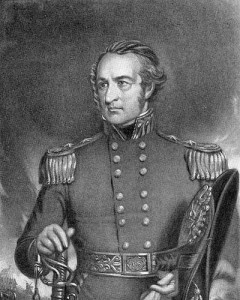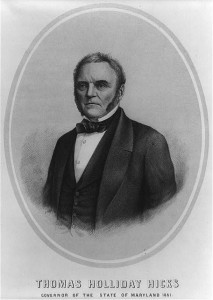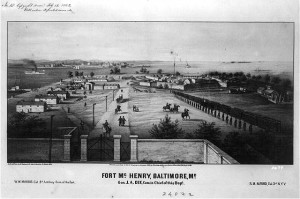A Special Messenger’s Adventure in Maryland: Impersonate a Methodist Preacher
From The New-York Times April 23, 1861:
PHILADELPHIA, Monday, April 22. …
From the Philadelphia Press of yesterday.
Hon. THOMAS B. LOWRY, a prominent citizen of this State, returned last evening from Washington City. He arrived as a bearer of dispatches from President LINCOLN to Gen. PATTERSON, of this city. He left Harrisburgh on Friday, and got to Baltimore in the midst of the excitement consequent on the arrival of the Massachusetts troops; he was a witness of the terrible scenes of Friday. It was expected that troops would arrive by the Philadelphia and Wilmington road, as well as by the Northern Central.
He telegraphed to Gov. CURTIN to prevent their departure from Philadelphia, and resorted to other means to prevent thair arrival, as he saw from five to seven thousand people, with arms in their hands, ready to destroy them when they arrived. No train came to Baltimore on Friday night. He took the cars for Washington city, and arrived there at daylight. He communicated the intelligence to Secretary CAMERON, Gen. SCOTT, and had a personal interview with President LINCOLN. Mr. LOWRY assured the President that Baltimore was in the hands of the mob, and that all communication with the North was cut off by burning the Railroad bridges.
The President was very much astonished, and said that Gov. HICKS had assured him, the day before, that the troops would have no trouble in passing through Baltimore, and that if they wanted any troops from Washington he (Gov. HICKS) would telegraph. The President had also received a dispatch from the Governor, saying: “Send no more troops.” He supposed that meant, he wished no help from Washington, and that he would take care and see that the troops passed safely.
The President directed a Cabinet meeting on Saturday morning. After the meeting was adjourned, Mr. LOWRY was requested to deliver a verbal communication from the President to Gen. PATTERSON, of this city, and accordingly left Washington on Saturday afternoon, and arrived in Baltimore in the evening. He then proceeded on foot to a point opposite Fort McHenry, and within communicating distance of the fort. He remained there at a farm-house until 3 o’clock yesterday morning, when he took a horse and rode rapidly for seven miles without being molested, and stopped at another farm-house, where he left his horse. He then got into a farm-wagon and started north. They had not proceeded far, when they were met by a number of men with rifles in their hands, and stopped. This was about nine miles north of Baltimore. They wished to know who Mr. LOWRY was, and were informed that he was a Methodist preacher. They told him “to go to h — l,” to which he replied, “Brethren, I can pray for you, but I cannot go there.” He was suffered to pass unmolested.
He was stopped several times on his journey, but was always permitted to pass. He found sentinels and armed men at all points in the State of Maryland, whose business appeared to be the detention and examination of wayfarers. Finally, about half past four o’clock, he arrived at Havre-de-Grace, and crossed the Susquehanna in a skiff. After a good deal of trouble he succeeded in reaching the telegraph office, and telegraphed to Wilmington for a special train. At this point there were four merchants who had arrived from Baltimore. They were Union men, who had been compelled to leave the city in consequence of the troubles. The special train arrived, and they came on to Philadelphia, where they arrived about 7 o’clock last evening. Mr. LOWRY at once called on Gen. PATTERSON, and delivered the message with which he had been charged.
We learn from Mr. LOWRY that the Government is well provided with arms, and competent to sustain itself, at least until succor is obtained. In one of the farm houses at which he stopped he saw two badly wounded men of Gen. SMALL’S brigade. One of them had his arms broken, and was otherwise injured. His name was FREDERICK RHEIN, and he belonged to the second company. He said that he had been wounded with brick-bats, had no arms to defend himself, was knocked down, and made his way to the house of this man, who took care of him. The other man was unknown.
It is the universal opinion in Baltimore that the Massachusetts men behaved towards the mob with the greatest forbearance, and only fired when to fire was a necessity. Governor HICKS was still firm to the Union, but he was held in awe by the mob, who neutralized and nullified his efforts.
Robert Patterson, emigrated from Ireland. He served in the War of 1812 and was a general in the Mexican-American War. His father was banished from Ireland for being an insurrectionist. By 1861 Robert owned 30 cotton mills in Pennsylvania. He had a very short Civil War career.



